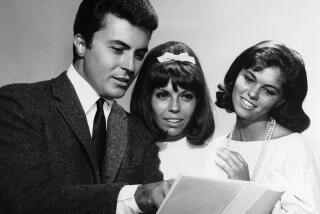Three-hour tour lasted a lifetime
- Share via
Bob Denver was a smart comic actor on two dumb sitcoms. How we need smart actors and dumb sitcoms now.
Denver, who died last Friday at age 70, was unforgettably Gilligan, he of “Gilligan’s Island.” Before that, perhaps less memorably because of the spottiness of TV syndication, he was the prototypical bearded beatnik slacker Maynard G. Krebs on “The Many Loves of Dobie Gillis,” which ran from 1959 to 1963.
“Gilligan” and Gilligan were, of course, the ultimate in lowest-common-denominator entertainment. Joyously so. American television had its elite phase in the early 1950s, when the few people who had TV sets were relatively wealthy. After that, the mass audience -- the world -- was ready for the likes of Maynard and Gilligan. (“Gilligan’s” creator, Sherwood Schwartz, set out to skewer that elitism from the start by naming the S.S. Minnow after Federal Communications Commission Chairman Newton Minow, who had denounced American television a “vast wasteland.”)
Schwartz believed his tale of lost souls was a sly microcosm of the Earth. His philosophical implication -- if something so slight as “Gilligan” can be said to have a philosophy or implications -- was that the castaways were humanity itself: seven disparate, archetypical humans (the smart one, the sexy one, the rich one, the girl-woman next door, etc.), flung together randomly and thrown into a hostile, inescapable environment with only their talents to contribute to a common good.
Denver, of course, played Everyman. The lovable loser, the bumbler. Schlemiel against nature. Week after week, you could count on Gilligan to foul up whatever complicated escape plan his fellow castaways had constructed. Not that he was malicious. Quite the opposite -- he was good-hearted and loving, always concerned for the welfare of his fellows (remember: “If not for the courage of the fearless crew, the Minnow would be lost”). But despite Gilligan’s best intentions, cruel fate always intervened.
Somewhere on the planet, right now, the Skipper is beating his cap on his Little Buddy and ranting, “Gilligan!” Gilligan was ageless. He could have been 17 or 50 -- it was never clear. He was also basically sexless. Even on an island with two young and beautiful single women, he never got any action. Or even a hint of action.
With his floppy haircut, bony build and eager, open face, you had to root for, and identify with, Gilligan. He may have been a TV original, but the character had echoes of earlier greats. Gilligan was a poor man’s Chaplin (if Chaplin hadn’t already been the poor man’s Chaplin), and, in their physical comedy, he and the Skipper were a reduced version of Laurel and Hardy.
Thanks to its unending repeats, “Gilligan” has wormed into the popular culture like mildew inside wallpaper, ever-present and permanent. It has inspired evocative catchphrases that haven’t seemed to fade even after two generations. A three-hour tour. Little Buddy. An uncharted desert isle. And aside from the defining “Ginger vs. Mary Ann” debate familiar to every American male, “Gilligan” inspired one of the great TV trivia questions: What was Gilligan’s first name? (Special bonus question: What was the Skipper’s full name? See answers below.)
Less well known is Denver’s more idiosyncratic creation, Maynard G. Krebs, who defined for Middle Americans the image of the beatnik -- bearded, bongo-playing and so averse to work that he would shriek every time the word was uttered.
In many ways, Denver in real life was more like Gilligan than Maynard. He worked constantly after “Gilligan’s Island” in smaller roles but was so hopelessly typecast by the show that he would never truly star in anything. Yet Denver never complained about a TV legacy that stopped in 1967 with the cancellation of his signature series. He was easygoing and friendly in interviews, even happy-go-lucky (in contrast to Tina Louise, aka Ginger, who once showed my colleague Frank Ahrens a three-page resume that emphasized her work in theater but had bitterly scrubbed any reference to “Gilligan’s Island”).
Denver’s one real-life bridge to Maynard may have been his arrest, when he was 63, for possession of marijuana. (Denver, who received six months’ probation, claimed a fan mailed the contraband to him.) We could see Maynard Krebs doing that, but not Gilligan.
Denver played the castaway for just three seasons (1964-67), but it seems much longer, given the endless repeats. I am among a generation of Americans for whom “Gilligan” has been inescapable and ever-present.
I watched the original show as a child -- it was perfectly pitched to a 7-year-old’s understanding of fantasy -- and I even remember it on my wedding day 24 years ago. As I stood in the wings waiting to walk down the aisle, I noticed a TV. It was playing an episode of “Gilligan’s Island.” I was a bit jittery, but the familiar “Gilligan” rhythms -- the laugh track, the falling coconuts, Lovey and Thurston and the Skipper and the rest -- were strangely comforting. Then I made the mental connection; I was getting married at the Marina del Rey Hotel, in view of the very “tropic port” the castaways returned to. I took it all as a sign -- though of what I’m not sure. (The marriage worked out great; thanks for asking.)
So thanks, Little Buddy.
*
(Answers: Willy, though it was never used on the series. And Jonas Grumby. You can look it up.)
More to Read
The complete guide to home viewing
Get Screen Gab for everything about the TV shows and streaming movies everyone’s talking about.
You may occasionally receive promotional content from the Los Angeles Times.






